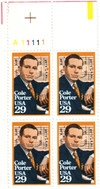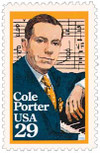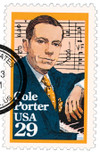
# 2550 - 1991 29c Performing Arts: Cole Porter
US #2555
1991 Cole Porter
- Final stamp in Performing Arts series
- Commemorates composer and lyricist Cole Porter
Category of Stamp: Commemorative
Set: Performing Arts
Value: 29¢, First Class mail rate
First Day of Issue: June 8, 1991
First Day City: Peru, Indiana
Quantity Issued: 149,848,000
Printed by: American Bank Note Company
Printing Method: Photogravure
Format: Panes of 50, from printing cylinders of 200 subjects (10 across, 20 down)
Perforations: 11
Reason the stamp was issued: The Cole Porter stamp was issued to commemorate the composer of some of America’s favorite musical comedies. It was issued the day before Porter’s 100th birth anniversary. It is the 12th stamp in the Performing Arts series.
About the stamp design: Like all the stamps in the Performing Arts series, the Cole Porter stamp was designed by Jim Sharpe. It shows Porter sitting at his piano. This image is based on a photo from the Museum of the City of New York. The sheet music in the background is a portion of the first song Porter wrote at age 10.
First Day City: The First Day of Issue ceremony took place in Peru, Indiana, Porter’s hometown. About 950 residents attended the ceremony at the local high school. The school’s swing choir performed a number of Porter’s most famous tunes, as well as singing “Happy Birthday” to him.
About the Performing Arts series: On May 24, 1978, the USPS issued the first stamp in the Performing Arts Series, honoring Jimmie Rodgers.
The Jimmie Rodgers stamp was issued on May 24, 1978, in his hometown of Meridian, Mississippi. The stamp issue coincided with the town’s annual Jimmie Rodgers Festival. The stamp shows Rodgers as the “Singing Brakeman,” a character based on his previous experience on the railroad that he later also portrayed in a short film. Called the “Father of Country Music,” Rodgers was the first person ever inducted into the Country Music Hall of Fame.
Less than two months after the Rodgers stamp was issued, the USPS issued a second stamp in the series. That’s because just five days after the Rodgers stamp was issued, the first class rate increased from 13¢ to 15¢. The second stamp was issued on July 3, marking George M. Cohan’s 100th birthday. It was issued in his hometown of Providence, Rhode Island. The stamp paid tribute to Cohan’s long list of patriotic songs with its blue field of stars and the song title, “Yankee Doodle Dandy.” In addition to writing songs, he was also a playwright, producer, and director and received a Congressional Gold Medal for his work.
The third issue in the series honored Will Rogers. It was issued on his 100th birthday, November 4, 1979, in Claremore, Oklahoma, where he spent his final years. Known as America’s cowboy philosopher, the stamp pictures him in character as a cowboy. Rogers’ homespun humor and political wit earned him a weekly column, a series of books, and success as an actor.
The series continued in 1980 with a stamp honoring W.C. Fields on January 29, his 100th birthday. It was issued in Beverly Hills, California and included an illustration of Fields juggling. Fields learned to juggle at an early age and went on to perform a juggling act on Broadway in the Ziegfeld Follies. In 1915, Fields starred in a silent film but did not win fame until the advent of sound films. By 1931, he had moved to Hollywood, where he began writing, directing, and starring in films.
On June 8, 1982, a stamp honoring the Barrymore family, picturing Lionel, Ethel, and John Barrymore was released. Issued at the Ethel Barrymore Theatre in New York City, the stamp also marked the 100th anniversary of the Actors Fund of America, which is the world’s oldest theatrical charity, providing aid to struggling entertainers. The Barrymores were considered the “royal family of Broadway” in the 1920s.
In 1984, Douglas Fairbanks joined the Performing Arts Series. The Fairbanks stamp was issued on his 101st birthday, May 23, in his birthplace of Denver, Colorado. The stamp pictures Fairbanks in two of his famous roles. The large portrait depicts his character from the Thief of Baghdad, while the smaller figure shows his character from the Three Musketeers.
Less than a month after the Fairbanks stamp was issued, came one honoring Irish tenor John McCormack. It was issued in Boston, Massachusetts on June 6, shortly before McCormack’s 100th birthday. The stamp was a joint-issue with Ireland, where McCormack was born. This stamp was the only one in the series not designed solely by James Sharpe. He worked with Irish artist Ron Mercer. The stamp pictures McCormack in his role of Edgardo in Lucia di Lammermoor as well as how he would have dressed for a concert.
The next stamp in the series honoring composer Jerome Kern was issued on January 23, 1985, four days before his 100th birthday. It was issued at the New York Public Library in New York City. Artist James Sharpe used historic photos from the NY Public Library as resources for the stamp art. Kern composed over 1,000 songs and 108 theatrical scores and has been called the “King of the American Musical Stage.”
On April 29, 1986, Duke Ellington joined the series on his 87th birthday. It was issued at the annual celebration of the Duke Ellington Society in New York City. The Ellington stamp was the first in the series not to carry the words “Performing Arts.” It also only featured one portrait of the composer and bandleader. It was based on a photo of Ellington in his later years. Ellington wrote more than 6,000 songs during his long career and has been called the greatest composer American society has ever produced.
The series continued in 1987 with a stamp honoring operatic tenor Enrico Caruso. It was issued two days after his 114th birthday on February 27. The first day ceremony was held at the Metropolitan Opera, where Caruso performed several times. The stamp features a portrait of Caruso as his character the Duke of Manua in Rigoletto. Caruso was one of the greatest operatic tenors of all time, mastering at least 67 opera roles and had a repertoire of 500 songs.
The 11th stamp in the series was issued on March 25, 1989, Arturo Toscanini’s 122nd birthday. Fittingly, it was issued at Carnegie Hall, where Toscanini conducted for several years. In fact, the stamp portrait was based on a photo taken of Toscanini at Carnegie Hall in 1947. Toscanini made his conducting debut at 19 and is widely considered to be one of the greatest conductors of the 20th century.
The final stamp in the series honored Cole Porter. It was issued on June 8, 1991, a day before Porter’s 100th birthday, in his hometown of Peru, Indiana. Behind the portrait of Porter is a portion of his first composition, “Song of the Birds”, which he wrote when he was 10 years old. During his life, Porter composed some of America’s favorite musical comedies – including Kiss Me, Kate, Anything Goes, and Can-Can.
History the stamp represents:
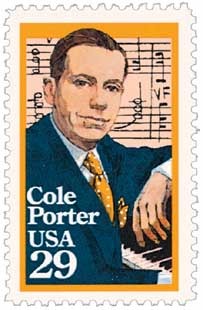
Cole Albert Porter was born on June 9, 1891, in Peru, Indiana.
Porter was the only child of a wealthy Indiana family. His grandfather, J.O. Cole, was considered the richest man in the state and had earned his money in the coal and timber industries.
J.O. Cole hoped his grandson would be a lawyer, but Porter's mother had introduced him to music at an early age. Porter learned to play violin when he was six and the piano when he was eight. He was already writing songs by the time he was ten. J.O. Cole sent his grandson to Worcester Academy in Massachusetts in 1905.
Porter brought a piano with him and his abilities helped him build many friendships. He was also an excellent student and graduated as class valedictorian. J.O. Cole congratulated him by sending him to tour France. Porter attended Yale University in 1909 and studied English, French, and music. He wrote approximately 300 songs at Yale, including the school's fight songs that are still used today.
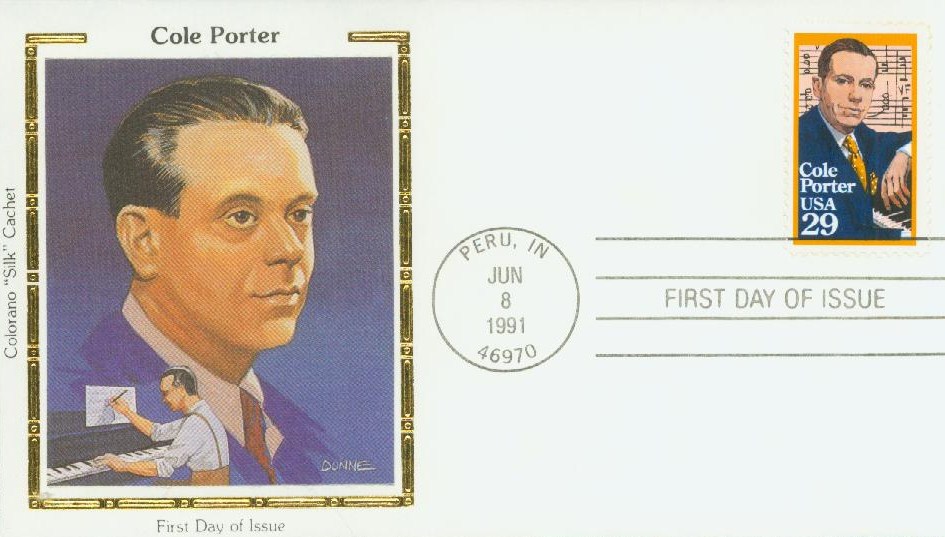
In 1915, Porter had his first song make it to Broadway, "Esmeralda." After that, Porter spent time in France. When he returned to the US in the late 1920s, his music began to gain popularity. He then went on to write many successful songs and musicals including "I Get a Kick Out of You," "Night and Day," "I've Got You Under My Skin," and "In the Still of the Night." He was eventually approached by E. Ray Goetz to write the score for his musical, Paris, which turned out to be a hit.
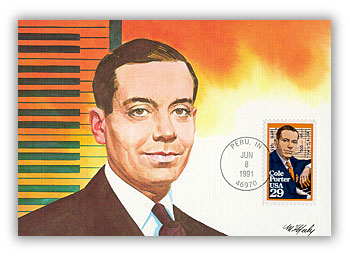
When the stock market crashed in October 1929, Broadway business declined, but Porter managed to keep working. Anything Goes debuted in 1934 and was considered one of Porter's greatest scores of the time.
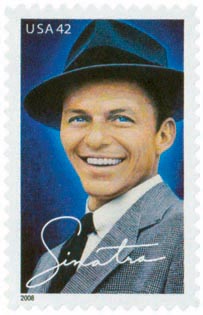
In 1937, Porter had a horseback riding accident that left him permanently disabled, but he only stopped composing for about seven months. In 1948, Porter wrote the score for his most successful and well-loved musical, Kiss Me Kate. The show won the first ever Tony Award for Best Musical, and Porter received the Tony for best composer and lyricist.
Several of Porter's songs also appeared in popular films. He produced the scores for You'll Never Get Rich, Something to Shout About, and Mississippi Bell. He also assisted in the creation of Night and Day, a largely fictional story based on his life starring Cary Grant. While it was panned by the critics, it was popular with moviegoers for the large number of classic Porter songs. Porter's last major hit song, "True Love," was featured in the Bing Crosby, Frank Sinatra, and Grace Kelly film High Society.
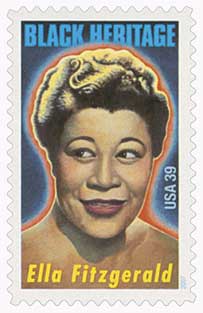
Porter's heath never fully recovered after his accident and he had to have a leg amputated. He never wrote again after that, and died six years later on October 15, 1964. Over the years, several artists recorded entire albums of his work, including Ella Fitzgerald, Rosemary Clooney, and Frank Sinatra.
Click here for an extensive list of Cole Porter songs.
US #2555
1991 Cole Porter
- Final stamp in Performing Arts series
- Commemorates composer and lyricist Cole Porter
Category of Stamp: Commemorative
Set: Performing Arts
Value: 29¢, First Class mail rate
First Day of Issue: June 8, 1991
First Day City: Peru, Indiana
Quantity Issued: 149,848,000
Printed by: American Bank Note Company
Printing Method: Photogravure
Format: Panes of 50, from printing cylinders of 200 subjects (10 across, 20 down)
Perforations: 11
Reason the stamp was issued: The Cole Porter stamp was issued to commemorate the composer of some of America’s favorite musical comedies. It was issued the day before Porter’s 100th birth anniversary. It is the 12th stamp in the Performing Arts series.
About the stamp design: Like all the stamps in the Performing Arts series, the Cole Porter stamp was designed by Jim Sharpe. It shows Porter sitting at his piano. This image is based on a photo from the Museum of the City of New York. The sheet music in the background is a portion of the first song Porter wrote at age 10.
First Day City: The First Day of Issue ceremony took place in Peru, Indiana, Porter’s hometown. About 950 residents attended the ceremony at the local high school. The school’s swing choir performed a number of Porter’s most famous tunes, as well as singing “Happy Birthday” to him.
About the Performing Arts series: On May 24, 1978, the USPS issued the first stamp in the Performing Arts Series, honoring Jimmie Rodgers.
The Jimmie Rodgers stamp was issued on May 24, 1978, in his hometown of Meridian, Mississippi. The stamp issue coincided with the town’s annual Jimmie Rodgers Festival. The stamp shows Rodgers as the “Singing Brakeman,” a character based on his previous experience on the railroad that he later also portrayed in a short film. Called the “Father of Country Music,” Rodgers was the first person ever inducted into the Country Music Hall of Fame.
Less than two months after the Rodgers stamp was issued, the USPS issued a second stamp in the series. That’s because just five days after the Rodgers stamp was issued, the first class rate increased from 13¢ to 15¢. The second stamp was issued on July 3, marking George M. Cohan’s 100th birthday. It was issued in his hometown of Providence, Rhode Island. The stamp paid tribute to Cohan’s long list of patriotic songs with its blue field of stars and the song title, “Yankee Doodle Dandy.” In addition to writing songs, he was also a playwright, producer, and director and received a Congressional Gold Medal for his work.
The third issue in the series honored Will Rogers. It was issued on his 100th birthday, November 4, 1979, in Claremore, Oklahoma, where he spent his final years. Known as America’s cowboy philosopher, the stamp pictures him in character as a cowboy. Rogers’ homespun humor and political wit earned him a weekly column, a series of books, and success as an actor.
The series continued in 1980 with a stamp honoring W.C. Fields on January 29, his 100th birthday. It was issued in Beverly Hills, California and included an illustration of Fields juggling. Fields learned to juggle at an early age and went on to perform a juggling act on Broadway in the Ziegfeld Follies. In 1915, Fields starred in a silent film but did not win fame until the advent of sound films. By 1931, he had moved to Hollywood, where he began writing, directing, and starring in films.
On June 8, 1982, a stamp honoring the Barrymore family, picturing Lionel, Ethel, and John Barrymore was released. Issued at the Ethel Barrymore Theatre in New York City, the stamp also marked the 100th anniversary of the Actors Fund of America, which is the world’s oldest theatrical charity, providing aid to struggling entertainers. The Barrymores were considered the “royal family of Broadway” in the 1920s.
In 1984, Douglas Fairbanks joined the Performing Arts Series. The Fairbanks stamp was issued on his 101st birthday, May 23, in his birthplace of Denver, Colorado. The stamp pictures Fairbanks in two of his famous roles. The large portrait depicts his character from the Thief of Baghdad, while the smaller figure shows his character from the Three Musketeers.
Less than a month after the Fairbanks stamp was issued, came one honoring Irish tenor John McCormack. It was issued in Boston, Massachusetts on June 6, shortly before McCormack’s 100th birthday. The stamp was a joint-issue with Ireland, where McCormack was born. This stamp was the only one in the series not designed solely by James Sharpe. He worked with Irish artist Ron Mercer. The stamp pictures McCormack in his role of Edgardo in Lucia di Lammermoor as well as how he would have dressed for a concert.
The next stamp in the series honoring composer Jerome Kern was issued on January 23, 1985, four days before his 100th birthday. It was issued at the New York Public Library in New York City. Artist James Sharpe used historic photos from the NY Public Library as resources for the stamp art. Kern composed over 1,000 songs and 108 theatrical scores and has been called the “King of the American Musical Stage.”
On April 29, 1986, Duke Ellington joined the series on his 87th birthday. It was issued at the annual celebration of the Duke Ellington Society in New York City. The Ellington stamp was the first in the series not to carry the words “Performing Arts.” It also only featured one portrait of the composer and bandleader. It was based on a photo of Ellington in his later years. Ellington wrote more than 6,000 songs during his long career and has been called the greatest composer American society has ever produced.
The series continued in 1987 with a stamp honoring operatic tenor Enrico Caruso. It was issued two days after his 114th birthday on February 27. The first day ceremony was held at the Metropolitan Opera, where Caruso performed several times. The stamp features a portrait of Caruso as his character the Duke of Manua in Rigoletto. Caruso was one of the greatest operatic tenors of all time, mastering at least 67 opera roles and had a repertoire of 500 songs.
The 11th stamp in the series was issued on March 25, 1989, Arturo Toscanini’s 122nd birthday. Fittingly, it was issued at Carnegie Hall, where Toscanini conducted for several years. In fact, the stamp portrait was based on a photo taken of Toscanini at Carnegie Hall in 1947. Toscanini made his conducting debut at 19 and is widely considered to be one of the greatest conductors of the 20th century.
The final stamp in the series honored Cole Porter. It was issued on June 8, 1991, a day before Porter’s 100th birthday, in his hometown of Peru, Indiana. Behind the portrait of Porter is a portion of his first composition, “Song of the Birds”, which he wrote when he was 10 years old. During his life, Porter composed some of America’s favorite musical comedies – including Kiss Me, Kate, Anything Goes, and Can-Can.
History the stamp represents:

Cole Albert Porter was born on June 9, 1891, in Peru, Indiana.
Porter was the only child of a wealthy Indiana family. His grandfather, J.O. Cole, was considered the richest man in the state and had earned his money in the coal and timber industries.
J.O. Cole hoped his grandson would be a lawyer, but Porter's mother had introduced him to music at an early age. Porter learned to play violin when he was six and the piano when he was eight. He was already writing songs by the time he was ten. J.O. Cole sent his grandson to Worcester Academy in Massachusetts in 1905.
Porter brought a piano with him and his abilities helped him build many friendships. He was also an excellent student and graduated as class valedictorian. J.O. Cole congratulated him by sending him to tour France. Porter attended Yale University in 1909 and studied English, French, and music. He wrote approximately 300 songs at Yale, including the school's fight songs that are still used today.

In 1915, Porter had his first song make it to Broadway, "Esmeralda." After that, Porter spent time in France. When he returned to the US in the late 1920s, his music began to gain popularity. He then went on to write many successful songs and musicals including "I Get a Kick Out of You," "Night and Day," "I've Got You Under My Skin," and "In the Still of the Night." He was eventually approached by E. Ray Goetz to write the score for his musical, Paris, which turned out to be a hit.

When the stock market crashed in October 1929, Broadway business declined, but Porter managed to keep working. Anything Goes debuted in 1934 and was considered one of Porter's greatest scores of the time.

In 1937, Porter had a horseback riding accident that left him permanently disabled, but he only stopped composing for about seven months. In 1948, Porter wrote the score for his most successful and well-loved musical, Kiss Me Kate. The show won the first ever Tony Award for Best Musical, and Porter received the Tony for best composer and lyricist.
Several of Porter's songs also appeared in popular films. He produced the scores for You'll Never Get Rich, Something to Shout About, and Mississippi Bell. He also assisted in the creation of Night and Day, a largely fictional story based on his life starring Cary Grant. While it was panned by the critics, it was popular with moviegoers for the large number of classic Porter songs. Porter's last major hit song, "True Love," was featured in the Bing Crosby, Frank Sinatra, and Grace Kelly film High Society.

Porter's heath never fully recovered after his accident and he had to have a leg amputated. He never wrote again after that, and died six years later on October 15, 1964. Over the years, several artists recorded entire albums of his work, including Ella Fitzgerald, Rosemary Clooney, and Frank Sinatra.
Click here for an extensive list of Cole Porter songs.








